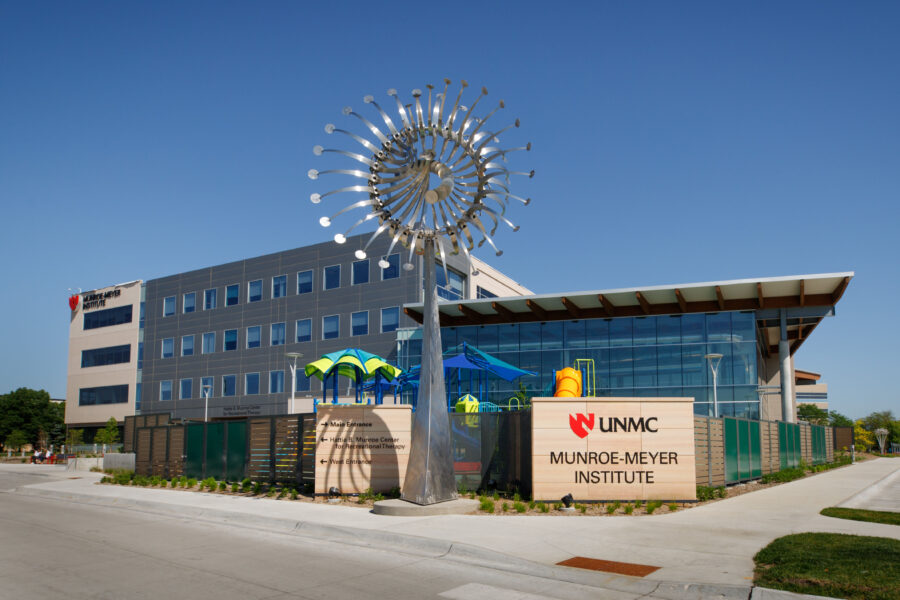Jessica Stump found herself in a “choose your own adventure” experience last summer.
Stump was part of the first cadre of the Summer Undergraduate Research Program, or SURP, held at the Munroe-Meyer Institute.
The program, now in its second year at MMI, gives undergraduate students an immersive summer research experience in one of MMI’s clinical research labs.
Stump helped to work with participants for ongoing studies in the lab. She also had the opportunity to do independent data analysis.
“Be your own advocate. If you want more to do, ask. Then I got a richer experience,” she said. “The mentors pick up on that, and they love that because they want you to have the richest experience you can have.”
Students gain firsthand experience by becoming part of a research team and having a dedicated mentor. Students also are provided with professional development opportunities, weekly educational activities and several team-building activities during the summer.
“Providing opportunities for young people to participate in research, learn about it and figure out if it’s something they want to do is really important,” said MMI Director of Research Jennifer Blackford, PhD. “They’re getting direct experience and mentorship in the lab but also this professional development within the program.”
Students in the program are assigned to faculty who volunteer to take on a mentee. Students are matched to labs and mentors based on personal statements submitted during the application process and their individual skill sets.
For faculty with smaller labs, it can mean not needing to hire a full-time research assistant, Dr. Blackford said. Having a student not only helps fill the gap but allows an opportunity to provide mentorship in an intensive research setting.
Students also provide perspective in their labs with fresh ideas and experiences.
“That can really enrich your science. Any time we can bring diversity of any kind into our process, we have better science, and we get better ideas,” Dr. Blackford said.
About a dozen students applied the first year, with six accepted. This summer’s group grew to seven students working in physical therapy, the integrated Center for Autism Spectrum Disorder, pediatric feeding, severe behavior and the Emotional Neuroscience Lab.
All students receive a $6,000 stipend for the 10-week session. Eventually, Dr. Blackford said she would like to see scholarships for interested students as well as housing stipends.
Katelyn Kelley, SURP coordinator, said organizers were upfront that there could be hiccups during the program’s first year. Students and faculty also complete surveys over the course of the program. The results help Dr. Blackford and Kelley gauge what works and what doesn’t.
Suggestions and feedback were taken into consideration leading into the program’s second year, and some changes were implemented, Kelley said.
Stump and fellow SURP student Carter Welch both accepted full-time positions at MMI after the program and before heading off to graduate school. They came full circle, serving in mentor-type roles for the new group of SURP students.
“I cannot express how much I have benefited from this experience and how it has shaped me as a researcher,” Stump said. “It will continue to influence the way I structure my approaches to problems and questions.”
Welch, who worked in the MMI Department of Severe Behavior, assisted with research and literature reviews and worked with clients.
In addition to learning new research skills, Welch also developed a strong relationship with his mentor and continued to lean on her for advice in applying for graduate school.
He also bonded with his fellow students, a sentiment that Stump echoed.
“We all came from different backgrounds and then came together here to make a cohesive unit of individuals aspiring to live and lead in the world with purpose after our time here,” Welch said. “This was a great opener for all of us to understand what needs to happen going forward.”
The SURP program also provides an important opportunity to expose undergraduate students to the field of intellectual and developmental disabilities.
“Even if the students go on to be physicians or scientists in another area, we’ve now exposed them to intellectual and developmental disabilities,” Dr. Blackford said. “They have awareness of the people we love and take care of. The mission of MMI is to transform lives, and now we have a whole group who can do that.”
Dr. Blackford concluded that the potential long-term impact of the SURP program is far-reaching. “Everything that you teach and share with another person has a ripple effect. Even if my lab’s research discoveries don’t change the world, those discoveries may come from someone that I have mentored.”
